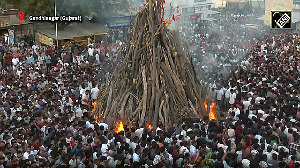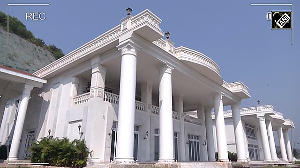A report by international agency Oxfam on Monday flayed rich countries for using World Trade Organisation, as the "battleground to force poor nations to open their markets and then dumping excess agricultural produce on them" thereby undermining the lives of poor farmers.
"Rich countries are demanding that poor countries pull down their barriers to trade and at the same time they are continuing to subsidise massive overproduction and dumping," the report said.
Releasing the report in India, Oxfam regional policy advisor Samar Verma said developing nations must have the right and power to decide on how best to support their domestic agriculture and regulate imports of products, which threaten to undermine their farmers' livelihood.
"The WTO architecture of tariff reduction on agriculture must be made pro-development and it should provide the flexibility of allowing developing countries to decide by themselves how to support their farmers," he said.
The report pointed out that US spends $1.3 billion every year in subsidies to support a rice crop that costs $1.8 billion. These subsidies made it possible the dumping of 4.7 million tonnes of rice on the world market at 34 per cent below the cost of production.
It warned that if rich countries prevailed at WTO, India, China, Nicaragua and Egypt were among 13 developing countries that could be forced to cut their rice tariffs and become vulnerable to cheap imports.
"If the Harbinson formula of tariff reduction were to be implied, India's tariff on rice would come down to 55 per cent from the current 78 per cent," Verma said.
It could seriously undermine the livelihood of Indian farmers and their food security, he added.
He said India should not compromise its rights to decide what's necessary for its domestic agriculture sector by binding to negotiated positions at WTO.
"India can still increase its subsidy on agriculture by 2.8 per cent to 10 per cent from the current 7.2 per cent. We should not compromise such leeway by binding ourselves to agreements, which are detrimental to our interest, at WTO," he said.
The Oxfam report estimates that developing countries also risk tariff cuts on imports of poultry (in 18 countries), milk powder (in 14 countries), sugar (13 countries), soyabeans (13 countries), maize (seven countries), and wheat (six countries), with "potential devastating effects for all these sectors".
Beyond WTO, the report accused the rich nations "of using World Bank and International Monetary Fund, and regional trade agreements to bully developing countries to open their markets prematurely".
To make matter worse, the developed countries have slashed agricultural aid by more than two-thirds in the past 18 years.
"The IMF and World Bank must stop forcing poor governments to cut their tariffs across the board," it said.





 © 2025
© 2025